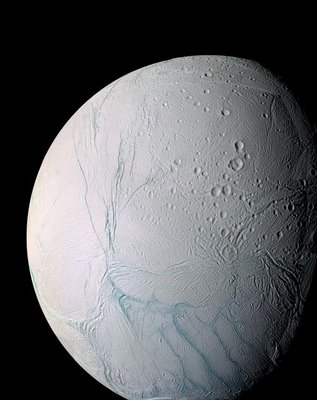 Astronomy compels the soul to look upward, and leads us from this world to another. — Plato, 'The Republic,' 342 B.C.
Astronomy compels the soul to look upward, and leads us from this world to another. — Plato, 'The Republic,' 342 B.C.It's been a good - no, great - week for NASA. Their Cassini spacecraft may have found evidence of liquid water reservoirs that "erupt in Yellowstone-like geysers" on Saturn's moon Enceladus. And the Mars Reconnaissance Orbiter successfully entered orbit around our red neighbor, Mars.
Both events, as expected, were peppered with quotes about the possibility of finding life on these worlds:
"We realize that this is a radical conclusion - that we may have evidence for liquid water within a body so small and so cold," said Dr. Carolyn Porco, Cassini imaging team leader at Space Science Institute, Boulder, Colo. "However, if we are right, we have significantly broadened the diversity of solar system environments where we might possibly have conditions suitable for living organisms."And:
"The missions currently at Mars have each advanced what we know about the presence and history of water on Mars, and one of the main goals for Mars Reconnaissance Orbiter is to decipher when water was on the surface and where it is now," said JPL's Dr. Richard Zurek, project scientist for the mission. "Water is essential for life, so that will help focus future studies of whether Mars has ever supported life."And that puts God-talk into the open spaces.
For years, people have been debating about what it would mean to find life on another planet in our solar system. Besides the obvious evolution/creation debate, another question always raises: What would finding microscopic life on other worlds mean to Christian theology and faith?
Many scientists who are Christians as well as Christian apologists and theologians muse it can only increase our sense of wonder at the creation God has made – and I’m right there with them.
I love this response from Richard J. Mouw (president of Fuller Theological Seminary and professor of Christian Philosophy) when he was asked by a reporter what finding life on Mars would mean to Christianity in 1997 :
So, go NASA!Nothing in my theology rules out the possibility of living organisms on other planets.
He pushed further: "But suppose they discovered intelligent life. Doesn't it bother you to think that humans are not the only thinking beings in the cosmos?"
"No," I answered. "If such beings turn out to be unfallen, we would want to figure out ways to learn from them. If they are fallen, we would have to devise strategies to evangelize them."
He kept pushing. "But for you Christians, who take the Bible as the true revelation of what reality is all about, doesn't the idea of many worlds throw your theology into a tailspin?"
Since I have learned much of my theology from hymns, I decided to quote one. I reminded the reporter that one of the most popular hymns sung at Billy Graham crusades is "How Great Thou Art." I quoted the first line: "O Lord my God, when I in awesome wonder consider all the worlds thy hands have made … "
This was no pious evasion. The hymn writer is making a profound theological point.
Creation is vast and complex. To consider God's awesome creating purposes is to be full of wonder. The Bible presents us with a "wonder-full" view of reality.
We need to cultivate this sense of wonder as we think about the meaning of scientific and technological advances. To be sure, not every "discovery" is something we ought to celebrate. Ancient errors and distortions regularly reappear in the disguise of "the new." But we will be best equipped to discern the genuine from the counterfeit if we are accustomed-not to a mood of fundamental worry—but to an experience of wonder that is grounded in a biblical perspective on reality.
(Enceladus image credit: NASA/JPL/Space Science Institute)